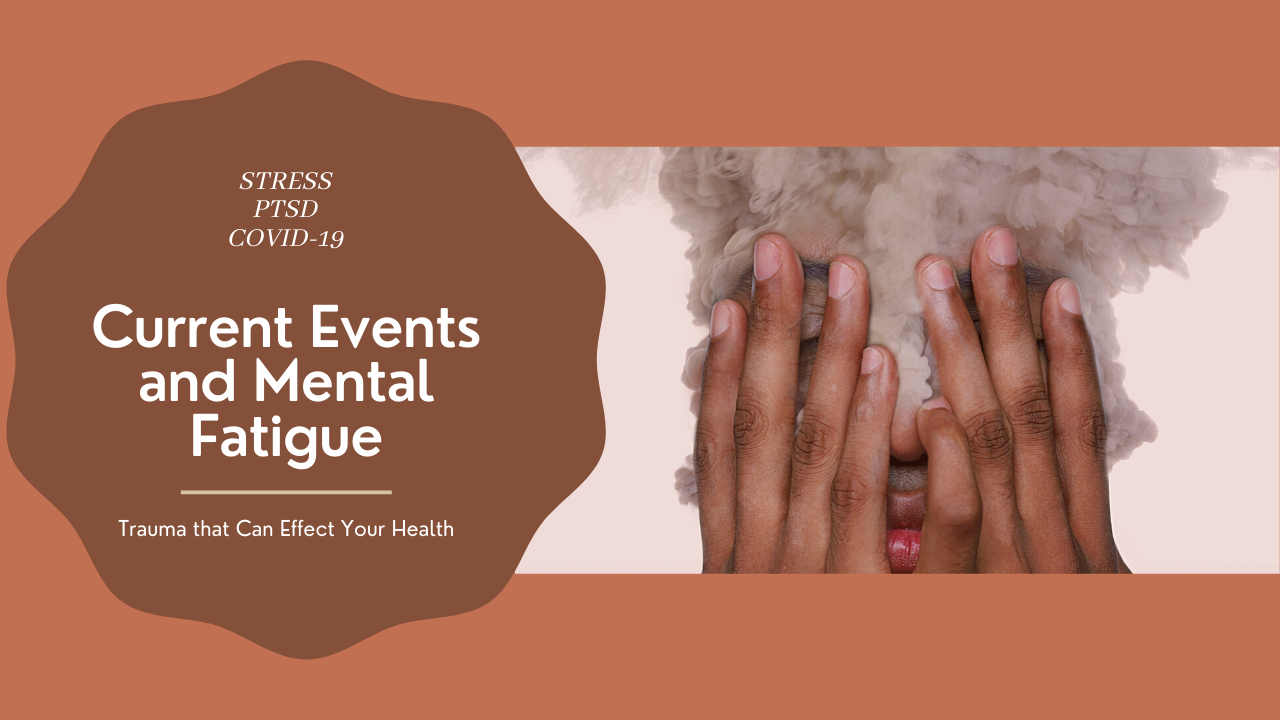Stress, Mental Fatigue, and PTSD Can Traumatize Your Health
Jul 09, 2020
How Current Events & Mental Fatigue Can Traumatize Your Health
Events are moving rapidly every day that feels like we are experiencing whiplash. Daily news, social media, and newspapers are exposing us to images of death, protest, riots, bigotry, racism, unrest, and a health crisis on steroids. These are traumatic events that are dramatically affecting bodies and minds.
A traumatic event is an incident that causes physical, emotional, spiritual, or psychological harm. Many are feeling threatened, anxious, or frightened that’s taking a toll both mentally and physically. Those feelings of uneasiness take many forms that may be hard to explain verbally. Feelings of hopelessness to situations that are out of control; that’s how trauma is manifest.
Racism, unequal health care, police brutality is rearing its ugly head, and there’s no escape this time! We see it constantly, and it’s permeating deep in our souls. Those images are ingrained in our minds, and they are affecting our health. It can feel and show up as PTSD.
Research has linked racism to a host of problems, including serious psychological distress, physical health problems, depression, anxiety, binge drinking, and eating disorders, according to Monica T. Williams of Psychology Today. The results can be irritability, anger, difficultly concentrating, fear, headache, nausea, withdrawal, and isolation. When you add the stress of dealing with COVID-19 makes the problems even more difficult
The wave of these ongoing traumatic current events is having a profound effect on People of Color with underlying chronic health conditions such as Diabetes, Heart Disease, Arthritis, Respiratory issues, and Digestive Problems. These events are impacting our ability to manage these conditions, and the body becomes exasperated while working to process and balance a healthy lifestyle and mental fatigue.

So, how do we manage these stressful situations before they cause adverse effects on our health?
- Talk to someone or write in a journal.
- Be gentle with yourself and work not to internalize situations that you have no control over.
- Find a support group or seek professional help.
- Give yourself a break from social media.
- Eat a balanced diet, exercise, stay hydrated, and get plenty of rest.
- Decrease alcohol consumption
- Maintain a positive daily routine with structured activities
- Pursue hobbies like gardening, reading, taking care not to overdo it
It’s common for people with signs of trauma to withdraw from friends and family or swing to the opposite of withdrawal to rage and anger. It’s important to respect their boundaries. Comfort and support can help the person overcome feelings of helplessness, grief, and despair. Trauma experts believe that face-to-face support from others is an essential factor in recovery and the ability to move forward.
Take notice when you or someone you know show symptoms of being withdrawn, sullen, angry, or show signs of depression. Sometimes all that is needed is for someone to listen and show concern.
Here are some tips on how to approach someone that is demonstrating prolong signs of mental trauma:
- Don’t pressure someone to talk- Be a good listener.
- Do normal activities together.
- Let them take the lead instead of you telling them what or what not to do.
- Be sure to manage your stress.
The world is changing fast, and the need to be consciously aware of what’s going on can leave you or someone you know feeling traumatized and mentally fatigued. Stay mindful and prayerful, and let nothing keep you down long.
Join my private Facebook group For Women Only as we address this issue and more. Love 4 Life Private Facebook Group.
If you feel you need someone to talk to about stress and your health, I do a FREE consultation to talk about you! Contact me. Make an appointment for a FREE consultation. See you soon!
Your Sister in the Journey,
Melesha
Stay connected with news and updates!
Join our mailing list to receive the latest news and updates from our team. When you join you get our free checklist 'Why diets don't work'.
Don't worry, your information will not be shared.
We hate SPAM. We will never sell your information, for any reason.

